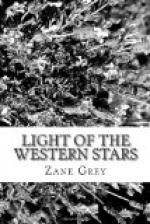She rode back across the mesa and down the trail, and, once more upon the flat, she called to the horse and made him run. His spirit seemed to race with hers. The wind of his speed blew her hair from its fastenings. When he thundered to a halt at the porch steps Madeline, breathless and disheveled, alighted with the mass of her hair tumbling around her.
Alfred met her, and his exclamation, and Florence’s rapt eyes shining on her face, and Stillwell’s speechlessness made her self-conscious. Laughing, she tried to put up the mass of hair.
“I must—look a—fright,” she panted.
“Wal, you can say what you like,” replied the old cattleman, “but I know what I think.”
Madeline strove to attain calmness.
“My hat—and my combs—went on the wind. I thought my hair would go, too. . . . There is the evening star. . . . I think I am very hungry.”
And then she gave up trying to be calm, and likewise to fasten up her hair, which fell again in a golden mass.
“Mr. Stillwell,” she began, and paused, strangely aware of a hurried note, a deeper ring in her voice. “Mr. Stillwell, I want to buy your ranch—to engage you as my superintendent. I want to buy Don Carlos’s ranch and other property to the extent, say, of fifty thousand acres. I want you to buy horses and cattle—in short, to make all those improvements which you said you had so long dreamed of. Then I have ideas of my own, in the development of which I must have your advice and Alfred’s. I intend to better the condition of those poor Mexicans in the valley. I intend to make life a little more worth living for them and for the cowboys of this range. To-morrow we shall talk it all over, plan all the business details.”
Madeline turned from the huge, ever-widening smile that beamed down upon her and held out her hands to her brother.
“Alfred, strange, is it not, my coming out to you? Nay, don’t smile. I hope I have found myself—my work—my happiness—here under the light of that western star.”




